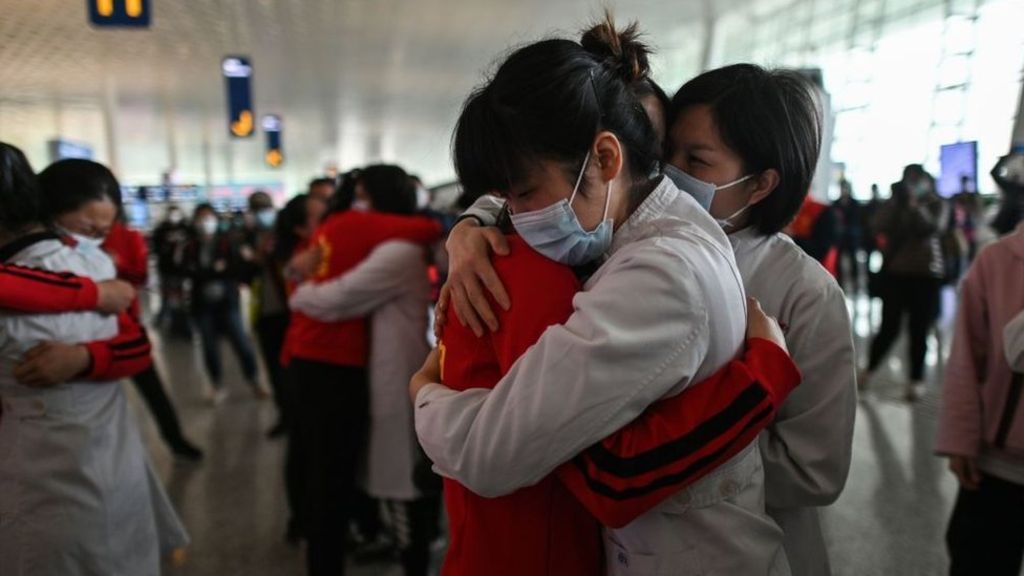Pakistan’s hospitals near collapse, China’s capital hit with another outbreak

A few minutes every morning is all you need.
Stay up to date on the world's Headlines and Human Stories. It's fun, it's factual, it's fluff-free.
As the COVID-19 pandemic continues to ravage the world, Pakistan and China – two countries that have eased lockdown restrictions – have found the virus to be harder to defeat than initially anticipated.
Pakistan
In Pakistan, authorities announced that they would reimpose strict lockdowns in selected areas on Monday after the federal government warned that at the current rate, COVID-19 cases could multiply eightfold by the end of July.
Officials reported more than 25,000 confirmed cases and nearly 600 deaths before the government eased lockdown restrictions on May 9, citing economic concerns and despite rising case numbers.
Since then, the country has recorded an additional 100,000 cases with confirmed infections doubling from one in 10 to more than one in five. More concerningly, like many other nations around the world, the figures are almost certainly an undercount of the actual numbers due to lack of testing.
In response, the World Health Organization (WHO) issued a letter urging the Pakistani government to reinstate lockdown regulations and to administer more tests.
“To this effect, Pakistan needs to take strategic decisions to either tighten or loosen public health measures, while ensuring economic prosperity, human rights and food security,” the letter read.
Pakistan’s health care workers have also criticized the government as they struggle to support the influx of cases
In a statement, the Pakistan Medical Association (PMA) reported that at least 35 health care workers have died of the pandemic. Furthermore, at least 3,600 health care workers have been infected with the virus.
At the same time, hospitals are getting ransacked and medical workers are being assaulted – at times with weapons like knives and iron rods – for not being able to admit patients or having to notify families of the death of their loved ones.
Worried about the continual violent treatment and backlash, many are now quitting their jobs at alarming rates or breaching work protocol, such as allowing families to reclaim bodies despite infection risks.
The government “did not listen to what doctors were saying. Now the result of this negligence is obvious,” wrote the PMA.
However, despite the harrowing reports, Prime Minister Imran Khan ruled out a nationwide lockdown on Saturday claiming that lockdowns don’t stop the spread of the virus. He also said that the nation could not afford to keep businesses closed, citing the potential loss of 18 million of the nation’s 74 million jobs.
“Unfortunately, the way the lockdown occurred, that was very painful for our lower class,” Khan said.
“We have to live with the coronavirus.”
China
Further up north, China is partially reinstating lockdown restrictions after an outbreak at a Beijing food market sparked fears of the creation of a second COVID-19 wave.
On Monday, the Beijing’s health authority reported 27 additional cases, bringing the total number of infections in the city to 106 since Thursday.
Wu Zunyou, chief epidemiologist for the Chinese Centre for Disease Control and Prevention (China CDC) told People’s Daily that the situation was very serious.
“Beijing is facing explosive and concentrated outbreaks even though the national epidemic has basically been blocked,” said Wu. “The fact that it happened in Xinfadi, a large wholesale market, is a challenge in itself as we try to carry out epidemiological investigations.”
In response, authorities have imposed travel restrictions in and out of Beijing and have reimposed lockdowns within the city and several surrounding regions.
According to Beijing Health Commission spokesman Xia Xiaojun, authorities have also further conducted over 76,000 tests on people in affected areas.
A warning to other nations
Both China and Pakistan act as stern warnings to other nations around the world that are also easing or looking to ease lockdown regulations.
Pakistan’s situation represents the struggle for governments to balance economic consequences with virus containment measures. On the other hand, the resurgence of virus cases in China, a nation that many thought had somewhat successfully defeated the pandemic, shows how difficult it truly is to eliminate a community outbreak.
This echoes prior statements released by WHO officials which warned the public against complacency and hasty coronavirus forecasts.
“I think it is important to put this on the table: this virus may become just another endemic virus in our communities, and this virus may never go away,” said WHO’s emergencies expert, Mike Ryan in May.
“I think it is important we are realistic and I don’t think anyone can predict when this disease will disappear. I think there are no promises in this and there are no dates. This disease may settle into a long problem, or it may not be.”
Have a tip or story? Get in touch with our reporters at tips@themilsource.com




Comments ()